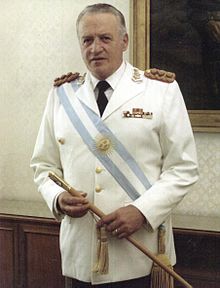Leopoldo Galtieri
| Leopoldo Galtieri | |
|---|---|
 |
|
|
44th President of Argentina De facto |
|
|
In office 22 December 1981 – 18 June 1982 |
|
| Preceded by | Carlos Lacoste (interim) |
| Succeeded by | Alfredo Oscar Saint Jean (acting) |
| Personal details | |
| Born |
15 July 1926 Caseros, Buenos Aires |
| Died | 12 January 2003 (aged 76) Buenos Aires, Buenos Aires |
| Nationality | Argentine |
| Political party | None |
| Spouse(s) | Lucía Noemí Gentili |
| Children | 3 |
| Alma mater | Colegio Militar de la Nación |
| Profession | Military |
| Religion | Roman Catholicism |
| Military service | |
| Allegiance |
|
| Service/branch |
|
| Years of service | 1944–1982 |
| Rank |
|
| Battles/wars | Falklands War |
Leopoldo Fortunato Galtieri Castelli (Spanish pronunciation: [leoˈpoldo foɾtuˈnato ɣalˈtjeɾi kasˈteʎi]; 15 July 1926 – 12 January 2003) was an Argentine general and President of Argentina from 22 December 1981 to 18 June 1982, during the last military dictatorship (known officially as the National Reorganization Process). The death squad, 601 Intelligence Battalion, directly reported to him. He was removed from power soon after the British re-took the Falklands Islands, whose invasion and occupation he had ordered.
Galtieri was an Italian Argentine born to working class immigrant parents. At 17 he enrolled at the National Military Academy to study civil engineering, and his early military career was as an officer in the engineering branch. As well as rising through the ranks of the Military, he continued his studies in engineering until the mid-1950s. In 1958, he became a professor of engineering at the Senior War College.
Galtieri was married to Lucía Noemí Gentili, and the couple had one son and two daughters.
In 1975, after more than 25 years as a combat engineer, Galtieri became commander of the Argentine engineering corps. He was an enthusiastic supporter of the military coup that started the self-styled National Reorganisation Process in 1976 and rose further, becoming a major general in 1977, and commander-in-chief in 1980 with the rank of lieutenant general. During the junta's rule, Congress was suspended, trade unions, political parties, and provincial governments were banned, and in what became known as the Dirty War, between 9,000 and 30,000 people deemed left-wing subversives disappeared from society. Torture and mass executions were both commonplace. The economy, which had been in dire condition prior to the coup, recovered for a short time, then deteriorated further.
...
Wikipedia
